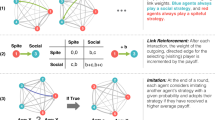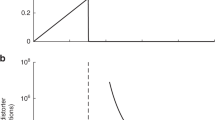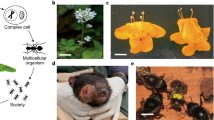Abstract
INCIDENTS in which an animal attacks another of the same species, drives it from a territory, or even kills and devours it are commonplace. They may be described as examples of biological selfishness. The effect consists of two obvious parts: the gains (in fitness) of the victor and the losses of the victim. Attempts to secure the gains are easily understood to be adaptive: this is the fundamental response to what Darwin called the “struggle for existence”. But, considering the more controversial catch-phrase of evolutionary theory—“the survival of the fittest”—it seems to be a neglected question whether the harm delivered to an adversary is always merely an unfortunate consequence of adaptations for survival. Could such harm ever be adaptive in itself ? Or nearer, to the possibility of a test, would we ever expect an animal to be ready to harm itself in order to harm another more ? Such behaviour could be called spite. Is it ever observed ?
This is a preview of subscription content, access via your institution
Access options
Subscribe to this journal
Receive 51 print issues and online access
$199.00 per year
only $3.90 per issue
Buy this article
- Purchase on Springer Link
- Instant access to full article PDF
Prices may be subject to local taxes which are calculated during checkout
Similar content being viewed by others
References
Hamilton, W. D., Amer. Nat., 97, 354 (1963).
Hamilton, W. D., J. Theor. Biol., 7, 1 (1964).
Hamilton, W. D., in Man and Beast: Comparative Social Behaviour (Proc. Smithsonian Institution Third Intern. Symp., 1969) (in the press).
Price, G. R., Nature, 227, 520 (1970).
Wright, S., Amer. Nat., 56, 330 (1922).
Wright, S., Genetics, 19, 395 (1965).
Wright, S., Ann. Eugenics, 15, 323 (1951).
Wright, S., Bull. Amer. Math. Soc., 48, 223 (1942).
Orians, G. H., and Willson, M. F., Ecology, 45, 736 (1964).
Marshall, A. J., Bowerbirds (Oxford Univ. Press, 1954).
Corbet, P. S., and Griffiths, A., Proc. Roy. Entomol. Soc., A, 38, 125 (1963).
Kirkpatrick, T. W., Insect Life in the Tropics (Longmans, London, 1957).
Walker, M. G., Canad. J. Res., 20, 235 (1942).
Author information
Authors and Affiliations
Rights and permissions
About this article
Cite this article
HAMILTON, W. Selfish and Spiteful Behaviour in an Evolutionary Model. Nature 228, 1218–1220 (1970). https://doi.org/10.1038/2281218a0
Received:
Revised:
Issue Date:
DOI: https://doi.org/10.1038/2281218a0
This article is cited by
-
Biological welfare economics: a natural science critique of normative economics
Journal of Bioeconomics (2023)
-
Assortment by Group Founders Always Promotes the Evolution of Cooperation Under Global Selection But Can Oppose it Under Local Selection
Dynamic Games and Applications (2023)
-
Evolution of Semi-Kantian Preferences in Two-Player Assortative Interactions with Complete and Incomplete Information and Plasticity
Dynamic Games and Applications (2023)
-
Ordinaries 13: apparent spite & apparent altruism
Journal of Bioeconomics (2023)
-
The evolution of extraordinary self-sacrifice
Scientific Reports (2022)
Comments
By submitting a comment you agree to abide by our Terms and Community Guidelines. If you find something abusive or that does not comply with our terms or guidelines please flag it as inappropriate.



